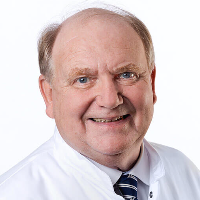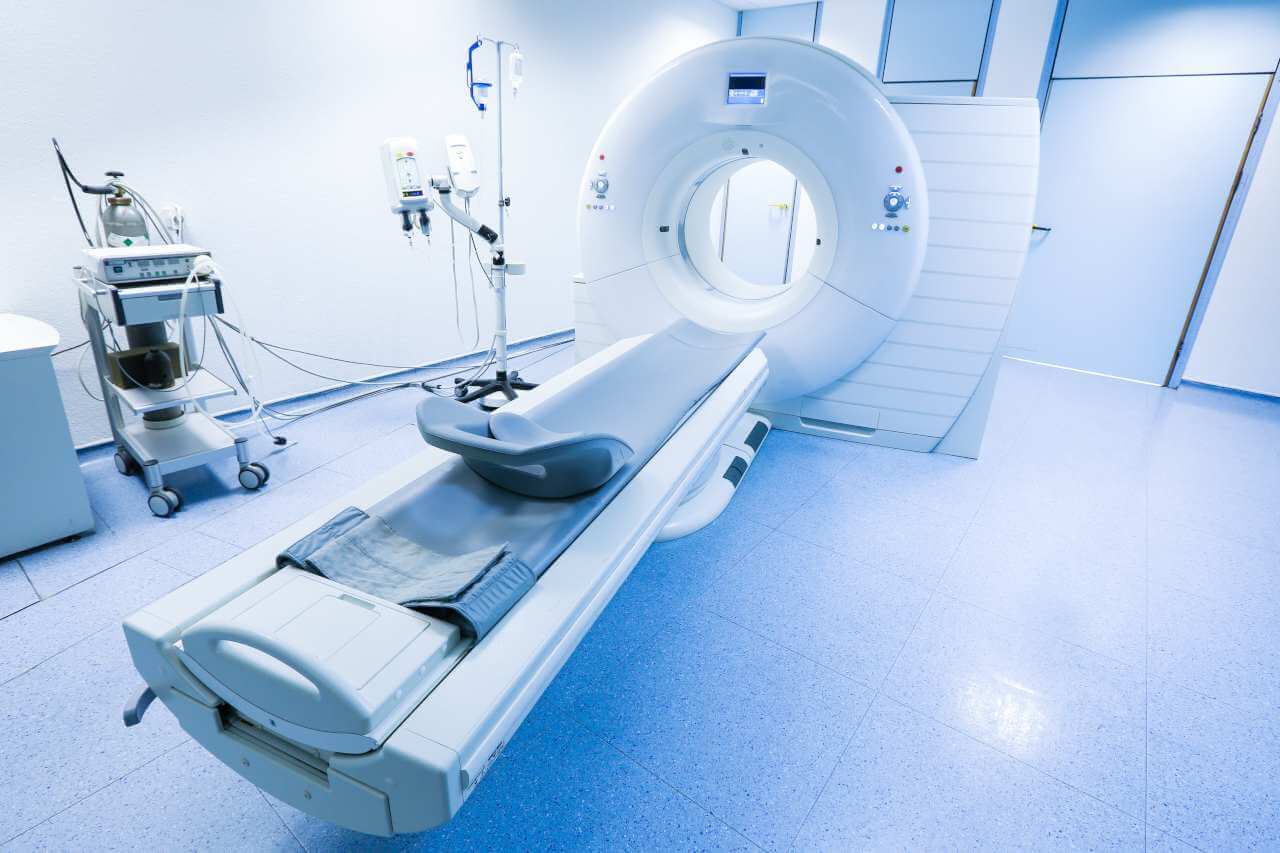
The program includes:
- Initial presentation in the clinic
- clinical history taking
- review of medical records
- physical examination
- laboratory tests:
- complete blood count
- biochemical blood analysis
- x-ray and bronchography
- electrocardiogram (ECG)
- high-resolution computed tomography (HRCT)
- pulmonary function test
- blood gas analysis
- bronchoscopy with biopsy
- histological and microbiological examination
- bronchial lavage
- nursing services
- development of individual treatment plan
Required documents
- Medical records
- Bronchoscopy (if available)
Service
You may also book:
 BookingHealth Price from:
BookingHealth Price from:
About the department
The Department of Pulmonology at the Meoclinic Hospital Berlin provides the full range of diagnostic examinations and effective conservative treatment of diseases of the respiratory tract and lungs. The department's specialists successfully deal with the treatment of common pulmonary diseases, and also have vast experience in managing patients with rare pathologies. The department's pride is a progressive technical base that allows the doctors to carry out high-precision diagnostic examinations of the respiratory system. The department has devices for X-ray scanning, spiroergometry, body plethysmography, computed tomography, bronchoscopy and pulmonary function tests. The treatment regimen is developed for each patient on an individual basis, thanks to which the doctors of the medical facility achieve the best therapeutic results. In the fight against pulmonary diseases, the department's specialists most often use drug therapy. The doctors also resort to endoscopic procedures and other therapeutic methods. The Head Physician of the department is Prof. Dr. med. Christian Witt.
The department's specialists often deal with the treatment of chronic obstructive pulmonary disease. This is a slowly progressive disease in which the patient develops inflammation of the lower respiratory tract and bronchial obstruction. As of today, the specific causes of the development of the disease have not been established, but doctors believe that smoking and unfavorable environmental conditions are the main risk factors. The diagnostic process for suspected chronic obstructive pulmonary disease begins with a thorough examination of the patient's medical history. This is followed by spiroergometry and body plethysmography. In some cases, X-ray and/or computed tomography, bronchoscopy are also required. As for the treatment tactics, first of all, the department's specialists recommend the patient to give up smoking if he has this bad habit. In most cases, doctors prescribe drug therapy that includes the intake of drugs individually selected by the doctor. Inhalation and oxygen therapy are often used. Special physiotherapy procedures also give a good effect.
The doctors of the medical facility are rightly proud of their rich experience in the treatment of lung cancer, which today is one of the most common types of oncology. Smoking is a key risk factor for developing cancer. At the initial appointment, the pulmonologist studies the patient's medical history and carries out a clinical examination with auscultation of the lungs and a visual assessment of the state of the lymph nodes. If the doctor suspects lung cancer after examination, then further diagnostic measures may include X-ray scanning, computed tomography, bronchoscopy, ultrasound scanning and skeletal bone scintigraphy. The three key techniques in the fight against lung cancer are surgical removal of the malignant tumor or lobe of the affected lung, chemotherapy, and radiation therapy. The specific treatment regimen is prescribed taking into account the patient's individual clinical case, the stage of the oncological proces, the presence or absence of metastases, and other important factors. The department's specialists also provide palliative care to patients with the advanced stage of cancer. The goal of palliative care is to relieve symptoms and improve the patient's quality of life.
The department's medical team also specializes in the conservative treatment of bronchial asthma, bronchitis, pneumonia, cystic fibrosis, alpha-1 antitrypsin deficiency, sarcoidosis, pleurisy and other pulmonary diseases, including rare ones. The vast clinical experience of the department's doctors allows them to determine the nature of pathological lesions of the lungs and respiratory tract with the highest accuracy, prescribing the most effective treatment so that the patient can quickly get rid of the disease and return to normal life.
The department's main clinical activities include:
- Diagnostics and treatment of bronchial asthma
- Diagnostics and treatment of bronchitis
- Diagnostics and treatment of chronic obstructive pulmonary disease
- Diagnostics and treatment of pulmonary emphysema
- Diagnostics and treatment of pulmonary fibrosis
- Diagnostics and treatment of pneumonia
- Diagnostics and treatment of tuberculosis
- Diagnostics and treatment of lung cancer
- Diagnostics and treatment of cystic fibrosis
- Diagnostics and treatment of alpha-1 antitrypsin deficiency
- Diagnostics and treatment of pleurisy
- Diagnostics and treatment of sarcoidosis
- Diagnostics and treatment of other pulmonary diseases
The department's range of medical services includes:
- Diagnostic options
- Pulmonary function tests
- Blood gas analysis
- Inhalation challenge tests
- Body plethysmography
- Spiroergometry
- Lung diffusion capacity assessment
- Diagnostic bronchoscopy
- Pulmonary circulation assessment (for example, to detect pulmonary hypertension)
- Diagnostics of obstructive sleep apnea using nocturnal polygraphy
- X-ray scanning
- Computed tomography
- Therapeutic options
- Drug therapy
- Physiotherapy procedures: chest percussion, inhalations, breathing exercises, thermotherapy, therapeutic exercises
- Oxygen therapy
- Therapeutic bronchoscopy (for example, for foreign body removal, stent implantation in case of airway stenosis)
- Other medical services
Curriculum vitae
Professional Career
- 1983 - 1984 Assistant Physician in the Department of Oral and Maxillofacial Surgery at the University Hospital Greifswald.
- 01.1983 Thesis defense and doctorate, Ernst Moritz Arndt University of Greifswald.
- 1984 - 1988 Training for board certification in Internal Medicine, Department of Internal Medicine at the Charite University Hospital Berlin.
- 1988 Board certification in Internal Medicine.
- 1988 - 1990 Partial specialization in Pulmonology, Institute for Lung and Tuberculosis Research, Department of Internal Medicine at the University Hospital Rechts der Isar Munich and the Heckeshorn Lung Hospital in Berlin.
- 09.1990 Board certification in Pulmonology.
- 1990 - 1992 Assistant Physician in the Department of Internal Medicine (specialization: Pulmonology) at the Charite University Hospital Berlin.
- 1992 Managing Senior Physician, Department of Pulmonology at the Charite University Hospital Berlin.
- 01.1993 Habilitation and Venia Legendi in Internal Medicine.
- 1994 Permission for advanced training courses in Pulmonology from the Berlin Medical Association.
- 05.01.1995 Examiner in Pulmonology.
- 16.12.1998 Professor of Pulmonology at the Faculty of Medicine of the Humboldt University of Berlin.
- 2001 Deputy Head of the Department of Cardiology, Pulmonology and Allergology.
- 2005 Head of the Department of Outpatient Pulmonology Clinic (formerly the Department of Pulmonary Oncology and Transplant Medicine).
Positions in Professional Societies and Organizations
- Committee Member for Thoracic Organ Transplantation of the German Heart Center Berlin.
- Expert Pulmonologist and the Examination Committee Member of the Permanent Committee on Organ Transplantation (StäKO) of the German Medical Association (BÄK).
- Member of the German Supervisory Board of Eurotransplant (Leiden, the Netherlands).
- Representative of the President of the European Parliament as International Medical Consultant (2014 - 2016).
Photo of the doctor: (c) Meoclinic
About hospital
The Meoclinic Hospital Berlin is one of Germany's most renowned multidisciplinary private hospitals offering top-class and patient-centered medical care. The hospital opened its doors to patients back in 2000 and today is deservedly proud of its vast experience. It has 28 specialized departments, each of which is responsible for the treatment of a particular group of diseases. A highly professional medical team consisting of 67 doctors takes care of the health of patients. The basis of the work of the doctors of the hospital is the use of the most advanced and, if possible, sparing treatment methods. The hospital is certified according to ISO 9001:2015 standards, so patients benefit from the highest level of the quality of service, adherence to hygiene and safety standards.
The hospital includes almost all fields of modern medicine: internal medicine, general and abdominal surgery, endocrine surgery, vascular surgery, hernia repair surgery, hand surgery, plastic surgery, pediatric surgery, cardiology, pulmonology, gastroenterology, rheumatology, proctology, gynecology, urology, ophthalmology, orthopedics, neurology, neurosurgery. To provide surgical treatment, the hospital has three high-tech surgical suites, which perform both minimally invasive interventions and DaVinci robot-assisted interventions, as well as the most complex operations lasting several hours. In addition, the hospital has an advanced Radiology Center with innovative devices for computed tomography, magnetic resonance imaging, ultrasound diagnostics and X-ray scanning. These resources allow providing accurate diagnostics and effective treatment of the highest European level.
Despite the fact that the hospital has advanced technologies and modern infrastructure, the focus of the medical staff is on the patient – his needs, wishes and well-being. During the treatment in this medical center, patients are surrounded by care, comfort, and they are treated with maximum respect and understanding. The doctors of the hospital use all their professionalism and medical knowledge for the benefit of patients, saving lives even in particularly complex cases.
Photo: (с) depositphotos
Accommodation in hospital
Patients rooms
The patients of the Meoclinic Hospital Berlin live in well furnished rooms, corresponding to the level of luxury five-star hotels. There is a fantastic view from the windows of the patient rooms on the Gendarmenmarkt, the Reichstag, the Friedrichstrasse or the courtyard of the hospital. The hospital has a pleasant atmosphere, which is also facilitated by soothing colors. The standard patient rooms include a comfortable bed, a bedside table, a desk and chairs, a wardrobe with a built-in safe for storing valuables, air conditioning, a minibar, a TV and a telephone. Free Wi-Fi is available in the patient rooms. Each patient room has an ensuite bathroom with shower and toilet, heated floor. There are bath slippers, towels and toiletries in the bathroom. A bathrobe, shower caps, shaving kit and hairdryer are available upon request.
Meals and Menus
The patients of the hospital are offered tasty and healthy three meals a day: breakfast, lunch and dinner. The menu mainly includes vegetable, fruit, poultry and fish dishes. Each patient has a choice of several menus, including traditional Russian and Arabic cuisine, as well as kosher and vegetarian meals.
If for some reason you do not eat all foods, you will be offered an individual menu. Please inform the medical staff about your dietary preferences prior to treatment.
Further details
Standard rooms include:
Accompanying person
Your accompanying person may stay with you in your patient room or at the hotel of your choice during the inpatient program.
Hotel
You may stay at the hotel of your choice during the outpatient program. Our managers will support you for selecting the best option.




